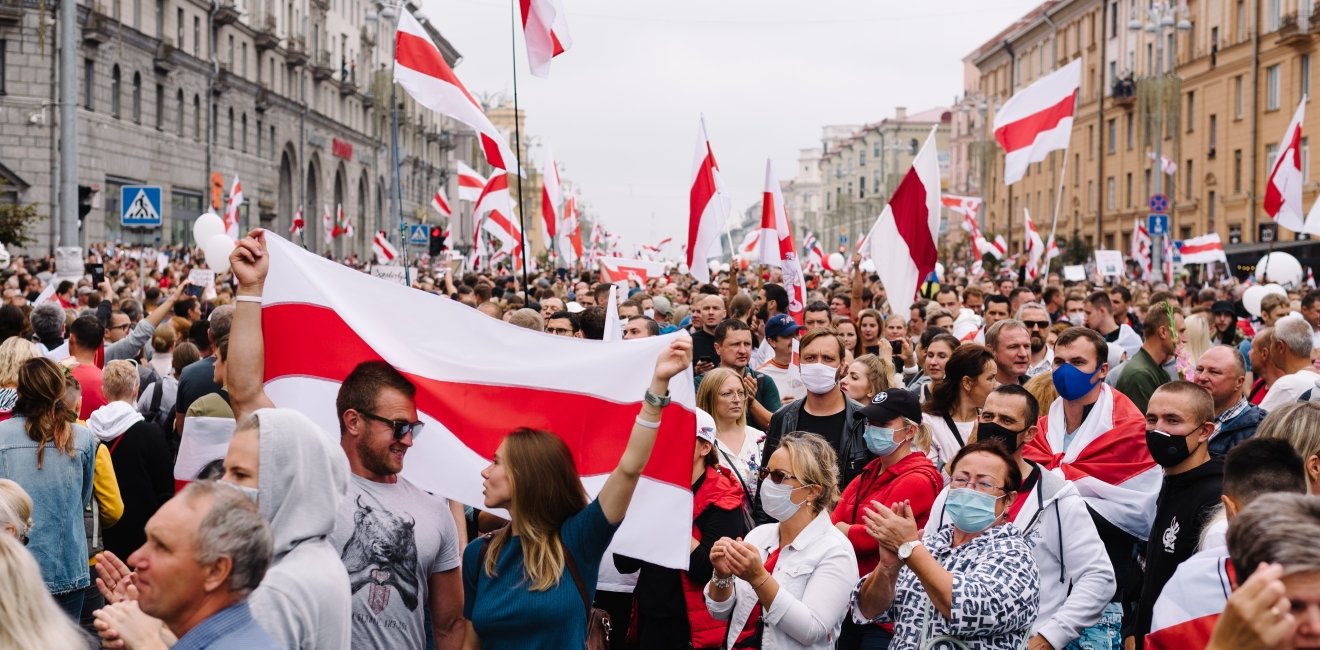
Q: Describe your background and what brought you to the Wilson Center.
I come from Minsk, Belarus and I have an interdisciplinary background, holding degrees in law, international relations and political science. I received my first BA degree in law from the Belarusian State Economic University in 2008. My early student years in Belarus coincided with the notorious 2004 referendum which abolished term limits for the Belarusian President Aliaksandr Lukashenka. It provided him with the possibility to run in the subsequent elections and to extend his mandate for an unlimited number of times. This referendum which was conducted in contradiction with the electoral law was criticized by the international community, analysts, and civil society activists. It left a strong impression on me as well as other young aspiring lawyers, showing that in some countries, such as Belarus, the main legal act – Constitution – can be amended whenever it is necessary for the ruling government, in violation of fundamental democratic norms and principles. This referendum and the way it was conducted made me question the fundamentals of the Belarusian legal system and wonder how Belarus can become a truly democratic state, not only de jure, but also de facto.
After graduating from university in Belarus, I moved abroad setting a goal to deepen my knowledge in law, human rights, and political science in the leading European universities. I pursued my first MA degree in Human Rights at the University of Manchester (the UK), a second MA degree in IR at the College of Europe (Belgium) and a PhD in political science from Bremen International Graduate School of Social Sciences (Germany). In addition, I did several traineeships, inter alia, at the UK Parliament and the European Parliament as well as several NGOs, focusing on different aspects of domestic and foreign policy in various post-Soviet countries, primarily Belarus, Ukraine, and Russia.
The recent 2020 presidential elections in Belarus, which were followed by massive unprecedented protests, have taken the whole world by surprise. The protests demonstrated that the stability of consolidated authoritarian regimes, even such long-lasting ones as the “last dictatorship in Europe” where the regime of Aliaksandr Lukashenka has ruled with an iron fist for over two decades, is not eternal and can be challenged with time. Although there has not been a change of power in Belarus yet as a result of the 2020 post-electoral protests, the Lukashenka regime has been substantially weakened by the unexpected wave of popular resistance. Thus, the 2020 presidential elections have become a critical juncture for the development of Belarus with crucial implications for the future trajectory of its domestic and foreign policy. These developments inspired me to develop a research project focusing on elections and protests in Belarus and apply for the George F. Kennan Fellowship in order to obtain access to the world’s best libraries and resources, to have an opportunity to interview policymakers in Washington D.C. on the situation in Belarus as well as join the community of prominent scholars and receive their feedback on my research.
Q: What project are you working on at the Center?
My current project is entitled “The 2020 Presidential Elections and Post-election Protests in Belarus: Internal Dynamics and Implications for Relations with Russia and the West”. It sets a goal to provide in-depth analysis of the recent elections and post-election protests in Belarus and make contributions to advancing academic scholarship and the policy debate on electoral authoritarianism.
More specifically, this project aims to: 1) generate and disseminate hitherto missing knowledge about the recent elections and post-election protests in Belarus and their impact on the awakening of Belarusian nationalism and democratization (internal dimension of the Belarusian uprising); 2) analyze the implications of the protest movement for Belarus’s relations with Russia and the West (external dimension of the Belarusian uprising).
Q: How did you become interested in your current research topic?
This study builds on previous research in the field of electoral authoritarianism which I have recently carried out as a post-doctoral fellow at the University of Tartu (Estonia), known for its strong expertise in electoral studies. During this fellowship, I analyzed the 2019 parliamentary elections in Belarus, using data collected as a member of the OSCE ODIHR election observation mission and focusing on the role of political parties and social movements in Belarus’s domestic politics.
The current unprecedented events in Belarus add relevance to analyzing elections in non-democratic regimes and provide rich data which can bring important insights about the functioning of autocracies. Thus, by carrying-out in-depth analysis of the recent August 2020 presidential elections and protests in Belarus, the proposed study will contribute to advancing scholarly debate on the micro-level dynamics of authoritarian elections, electoral integrity as well as the factors and mechanisms challenging the stability of authoritarian regimes.
Q: Why do you believe that your research matters to a wider audience?
The proposed research on Belarusian elections and post-election protests is a unique case study of popular mobilization which is relevant and important to a wider audience.
Belarus represents a country which is geographically sandwiched between two big international actors – Russia and the EU – and has a high geopolitical importance for both of them. Thus, the unprecedented socio-political developments in Belarus are certain to have an important impact not only on its domestic and international politics but also on the broader region at large. For instance, these developments are likely to reshape Belarus-Russia relations, posing both opportunities and challenges for the Kremlin. On the one hand, they can increase Russia’s bargaining power over the Lukashenka regime to promote a soft mode of occupation of Belarus via deep integration. On the other hand, the Belarusian uprising (if successful) can have a spill-over effect to Russia, threatening the stability of Putin’s regime. Thus, the Belarusian revolution can potentially play a crucial role in democratizing the EU neighborhood and creating a “ring of friends” around the EU borders in accordance with the fundamental goal of the European Neighborhood Policy and the Eastern Partnership Program.
Research on the ongoing unprecedented events in Belarus, where the authoritarian regime has withstood domestic and international democratizing pressure for the last 26 years, can substantially improve our understanding of the mechanisms and factors that can lead to regime stability or result in democratic changes in autocracies. It can also increase the understanding of the EU and American policymakers on how to calibrate their approach and intensify targeted action towards fostering democratic changes in this country.
Q: What is the most challenging aspect of your research?
This research is being conducted against the backdrop of violent repressions by the Belarusian regime vis-a-vis civil society, journalists, analysts, and the political opposition. In accordance with recently adopted laws in Belarus, an expression of any alternative opinion criticizing the government can be interpreted as an act of extremism punishable by long-term imprisonment. Thus, high precaution measures have to be taken during data collection, analysis and dissemination of research findings.
Another challenging aspect of this research is to detach my personal involvement in Belarus’s pro-democracy movement from empirical data collected during my field work in Minsk and Washington D.C. My personal experience with the object of my study, on the one hand, provides me with a nuanced understanding of various aspects of my research, but, on the other hand, can create potential biases during analysis.
Finally, Covid-19 has introduced complications and uncertainty into the process of conducting one’s research. Inter alia, some of my originally planned face-to-face interviews will have to be conducted online due to the continued pandemic-related restrictions in Washington D.C.
Q: What do you hope the impact of your research will be?
I hope my research will contribute to advancing the development of several strands of scholarship, i.e., on electoral authoritarianism, regime transitions and external democracy promotion. I also aspire to generate new empirical data and develop hypotheses which can be later tested on a larger family of cases. This research will also bridge the gap between academia and the world of policymakers and provide new insights on strengthening electoral integrity in non-democratic regimes as well as fostering democratic transition in the post-Soviet space. Furthermore, I hope it will provide an opportunity for a two-way transfer of knowledge between the USA, EU policymakers and the Belarusian democratic forces and increase the efficiency in their cooperation as well as facilitate the process of bringing democratic transition in Belarus.
The opinions expressed in this article are those solely of the authors and do not reflect the views of the Kennan Institute.
Author

Post-doctoral Researcher, Stockholm Center for Eastern European Studies

Kennan Institute
After more than 50 years as a vital part of the Wilson Center legacy, the Kennan Institute has become an independent think tank. You can find the current website for the Kennan Institute at kennaninstitute.org. Please look for future announcements about partnership activities between the Wilson Center and the Kennan Institute at Wilson Center Press Room. The Wilson Center is proud of its historic connection to the Kennan Institute and looks forward to supporting its activities as an independent center of knowledge. The Kennan Institute is committed to improving American understanding of Russia, Ukraine, Central Asia, the South Caucasus, and the surrounding region through research and exchange. Read more

Explore More
Browse Insights & Analysis
Greenland’s New Governing Coalition Signals Consensus

The Future of France's Far-Right Party

Ukrainian Issue in Polish Elections

